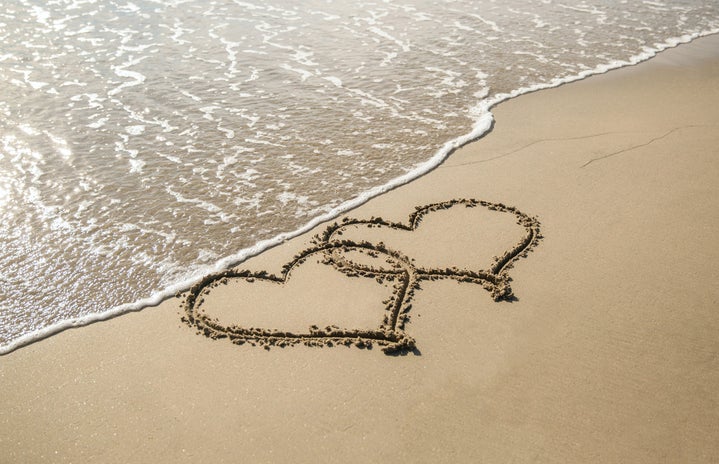I would like to preface this article with a trigger warning for abusive relationships, domestic violence, and emotional abuse.
Writing has always been a therapeutic vice for me. It’s one of the few mediums where I can contextualize my perspective, compartmentalize my feelings, and organize my thoughts. Most importantly, writing has served as the closing of one chapter of my life. This article has a somewhat selfish intention, as I’m using it as part of my healing journey, however, by no means am I using this to police anyone’s healing journey. I’m writing this for my fellow survivors; I see you, I hear you, I believe you. I’m writing this to aid in your own healing journey; use mine as a reference, not as a prescription. And most importantly, I would like to acknowledge my own privilege in the circumstances of my experience.
Despite being a bisexual woman, I am still a white, bisexual woman, thus I benefit from white privilege. In contrast to other minorities, the likelihood of retaining my safety, autonomy, and property was vastly higher than people of colour, trans/non binary folks, and disabled folks. I recognize how lucky I am to have left an abusive relationship, without any injury, scrutiny or judgement from the law, or being homeless. The disproportionate variance between white women and other minorities in abusive relationships is a harsh reality that needs to be addressed by legislative action.
In July 2018, New Zealand passed legislation granting domestic violence victims ten paid days leave to situate and protect themselves, and I would like to see Canada come out with the same.
If you take can only take one thing from this article please let it be this; I urge you to write to your representatives. No one should have to go through these experiences alone, we need better support systems for the most vulnerable folks in our society. Even if you have not been in an abusive relationship, I still urge you to use your privilege and use your voice to be an effective ally. Speak up for survivors. Speak up for those still in abusive situations. Speak up for those that are being silenced.
Now with that said, let me provide some background:
This past winter, I found myself in a difficult circumstances. Without divulging too much personal details, I realized that my relationship of over just a year had become toxic. Not only this, but my partner at the time had been abusing substances and became violent and aggressive towards me. Suffice to say, I was scared, terrified even, for my safety and that of my roommate and best friend. Thankfully, however, I had an amazing support system to help me through the process of breaking up with my partner, and moving him out. Thankfully, he’s taking care of himself and getting help, however, that does not excuse his actions. I forgave him for my well being, for I no longer wish to internalize the emotional turmoil I experienced towards the end of our relationship.
The breakup process itself is an exponentially, emotionally draining experience, but the healing process has been more so. I’m no stranger to traumatic events, however dealing with this kind of trauma was more difficult than I initially thought. Pain is not always a tangible thing; it can be hard to grasp something that isn’t physically affecting you. For myself, and many of those that leave abusive circumstances, the healing process is a long and difficult one. Heck, I’m still healing, and I will be for a while. But for those of you who may have just gotten out of an abusive relationship, or for those of you that might be contemplating doing so, I would like to share some sentiments with you. Firstly:
This Wasn’t Your Fault
I’m sure you’ve been told this, or you’ve seen posts on social media of this, but now I’m reminding you. When I broke up with my partner, I agonized over what I could have done to fix our relationship, what I could have done to support him, etc. But I did. You did. We tried. And we were gaslit to believe that certain things were our fault. Going from an abusive relationship to being single again is a time of enlightenment. You become aware of the toxicity that you were once told or manipulated to disregard. It’s an incredibly difficult thing to come to terms with because not only are you frustrated, vulnerable and scared, but you feel foolish, and have a warped sense of reality.
To be transparent, I disregarded a majority of my ex’s behaviour because I believed that I wasn’t naive enough to fall into an abusive relationship. But naivety has nothing to do with whether you find yourself in an abusive relationship or not. Abusers are manipulative, and they can weaponize trust built early on in the relationship to further their personal gain later. Not all relationships start out toxic. I admit openly that I do have a few good memories with my ex, but that does not invalidate the hurtful actions he caused. That was a difficult realization for me, nonetheless it was an important one, and that brings me to my next point:
Acknowledge Your Strength
You are here. You are alive. And, most importantly, you are strong.
My friends hammered this into me, every step of the way. They said it after I broke up with my ex, they said it the day after, and even to this day they remind me.
It takes strength to leave a relationship, especially a long term one, after all, past a certain point they become your norm, your comfort. It’s difficult to leave what you’re used to, and it’s harder to do so when you’re manipulated. This brings me to my next point:
Do NOT Hesitate to Ask For Help
I was scared.
It’s hard for me to ask for help. I don’t like to, I feel like a burden to people, and I prefer to be self-sufficient. However, self sufficiency is not healthy way to deal with issues. I haven’t gone to counseling since middle school after I finally reached a point of acceptance at my father’s passing, so recognizing that I needed counseling now was hard. But I do. It’s okay to ask for help; you are not a burden.
If you feel like you’re in an abusive relationship, reach out to a trusted family member, friend, colleague etc. I’m truly grateful that I reached out to several of my co-workers to help me with this process, and I’m eternally grateful to work in a supportive, comforting environment. School on the other hand, unfortunately I wasn’t as lucky, and that brings me to my last point:
Taking Time to Heal Is Not a Failure
I missed a lot of my classes. Like a lot.
I was scared to go to work and school as my ex knew both of the locations I’d be in. For a while, I was uncertain about his reaction to our breakup and I was extremely anxious to go to public spaces that he knew I frequented.
I tried to keep up with my classes and get notes from classmates, but as the school year ebbed towards completion, I knew I needed to apply for compassionate consideration. I ended up dropping two classes, but I attempted to try and apply for compassionate consideration for one class, and, despite discussing my circumstances, I wasn’t accomodated.
From my professor’s point of view it would not have been fair to accommodate me, as I “could have done my quizzes online and did not reach out in time”, as she pointed out, despite the fact that the quizzes are meant to be completed in class without the use of notes.
I ended up dropping the class before the final drop date.
I was initially deeply frustrated with this; I’d never had to drop classes before, and was on track to graduate next year.
Through this experience, I’ve come to realize some things about education. One of which is that while universities try their best to attempt to care for students, they are nonetheless still capitalist institutions that rely on making a profit. However, I’m the one paying their salaries. I’m paying for my education, and I don’t have to do it all at once. Recognizing that you need to take a break and slow down is an important step in healing.
While I would have liked to be accommodated, I’m glad that I’m fortunate enough to take my time with my education. University had been wearing me down for almost three years before I finally decided to take a break, and I truly needed it.
Taking a break is not a failure.
Taking time to heal is not a failure.
You are not a failure for making choices to assure a better mental health state.
Quitting is not failing, it’s giving yourself time to heal.
For many of us, taking time off of work, is not always a viable thing, due to financial dependence (this is where paid absence would be beneficial for abuse victims), but if you can take a leave, I urge you to, even if it’s just for a day or two.
Regardless of what you decide to drop or cut out from your life, recognize that it’s not a failure; it’s closing a chapter, and starting another.
In the word’s of fellow Ryerson alumni, artist and activist, Hana Shafi, “healing is not linear”. I am still healing, and I will be for a while. I’m in the process of finding a therapist, taking a spring course, and writing more. As aforementioned, this article is not meant to be prescriptive, instead I hope you find solidarity and strength in the small sentiments I have shared with you. And one more time:
You. Are. Not. Alone.

